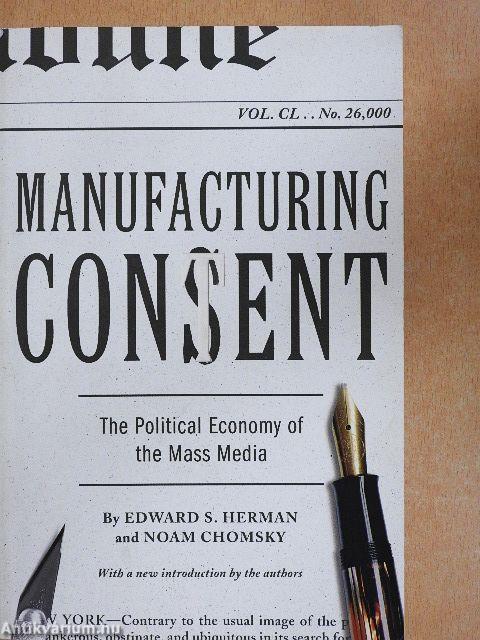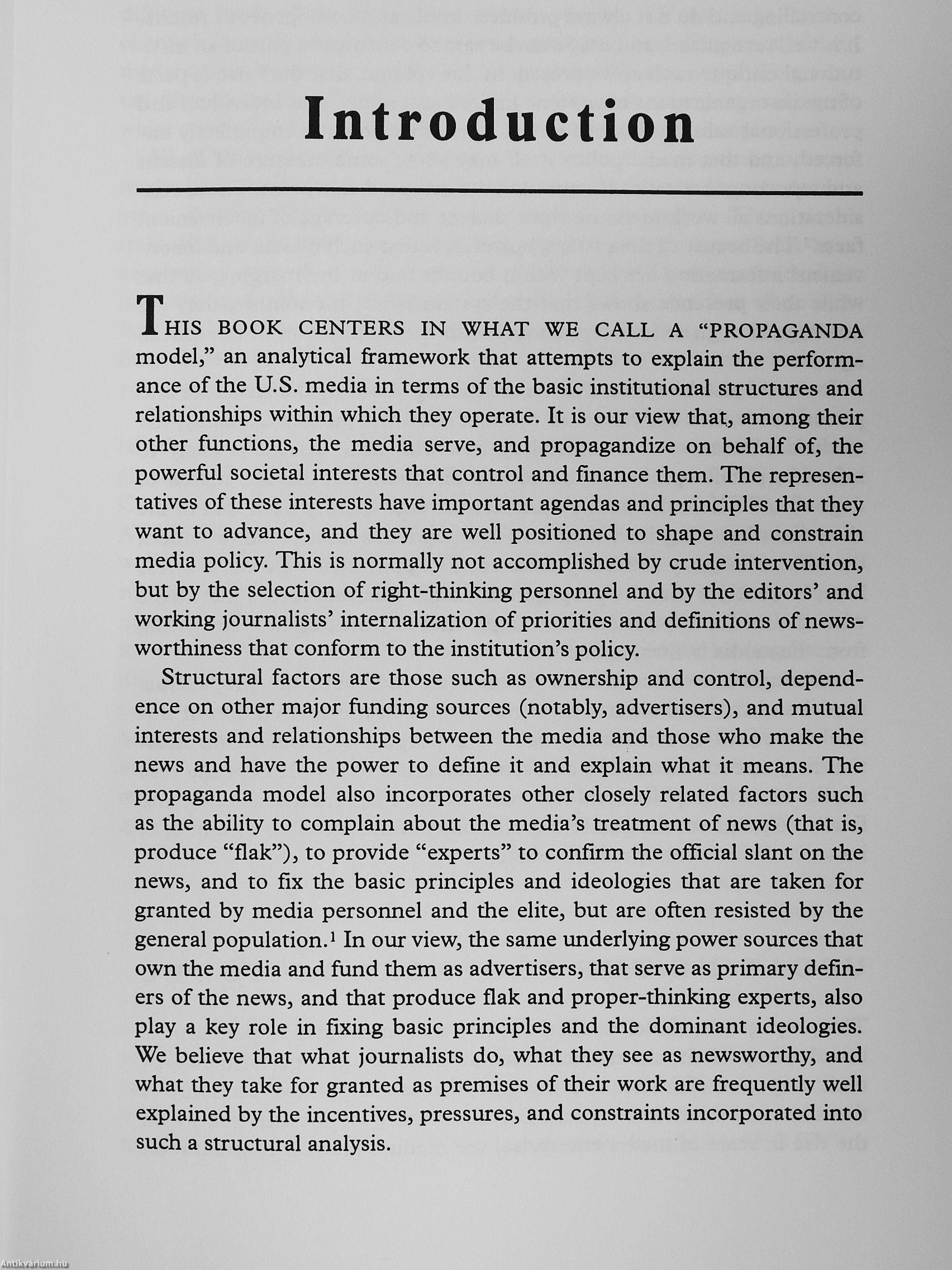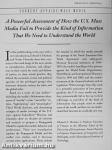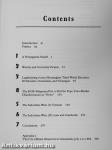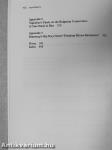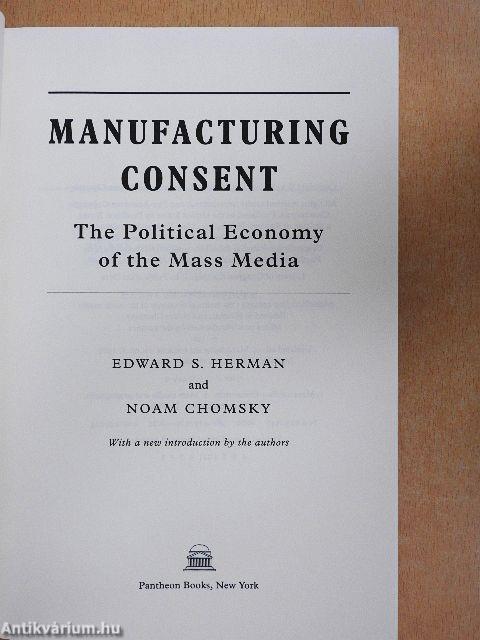1.103.846
kiadvánnyal nyújtjuk Magyarország legnagyobb antikvár könyv-kínálatát

VISSZA
A TETEJÉRE
JAVASLATOKÉszre-
vételek
Manufacturing Consent
The Political Economy of the Mass Media
| Kiadó: | Pantheon Books |
|---|---|
| Kiadás helye: | New York |
| Kiadás éve: | |
| Kötés típusa: | Ragasztott papírkötés |
| Oldalszám: | 412 oldal |
| Sorozatcím: | Current Affairs-Mass Media |
| Kötetszám: | |
| Nyelv: | Angol |
| Méret: | 23 cm x 16 cm |
| ISBN: | 0-375-71449-9 |
naponta értesítjük a beérkező friss
kiadványokról
naponta értesítjük a beérkező friss
kiadványokról
Előszó
TovábbFülszöveg
S18.95 U.S.A./S28.95Can.
CURRENT AFFAIRS/MASS MEDIA
A Powerful Assessment ofHoiv the U,S. Mass Media Fail to Provide the Kind of Information That We Need to Understand the World
In this pathbreaking work, now with a new introduction, Edward S. Herman and Noam Chomsky show that, contrary to the usual image of the news media as cantankerous, obstinate, and ubiquitous in their search for truth and defense of justice, in their actual practice they defend the economic, social, and political agendas of the privileged groups that dominate domestic society, the state, and the global order.
Based on a series of case studies— including the media's dichotomous treatment of "worthy" versus "unworthy" victims, "legitimizing" and "meaningless" Third World elections, and devastating critiques of media coverage of the U.S. wars against Indochina^—Herman and Chomsky draw on decades of criticism and research to propose a Propaganda Model to explain the media's behavior and performance. Their... Tovább
Fülszöveg
S18.95 U.S.A./S28.95Can.
CURRENT AFFAIRS/MASS MEDIA
A Powerful Assessment ofHoiv the U,S. Mass Media Fail to Provide the Kind of Information That We Need to Understand the World
In this pathbreaking work, now with a new introduction, Edward S. Herman and Noam Chomsky show that, contrary to the usual image of the news media as cantankerous, obstinate, and ubiquitous in their search for truth and defense of justice, in their actual practice they defend the economic, social, and political agendas of the privileged groups that dominate domestic society, the state, and the global order.
Based on a series of case studies— including the media's dichotomous treatment of "worthy" versus "unworthy" victims, "legitimizing" and "meaningless" Third World elections, and devastating critiques of media coverage of the U.S. wars against Indochina^—Herman and Chomsky draw on decades of criticism and research to propose a Propaganda Model to explain the media's behavior and performance. Their new introduction updates the Propaganda Model and the earlier case studies, and it discusses several other applications. These include
the manner in which the media covered the passage of the North American Free Trade Agreement and subsequent Mexican financial meltdown of 1994-1995, the media's handling of the protests against the World Trade Organization, World Bank, and International Monetary Fund in 1999 and 2000, and the media's treatment of the chemical industry and its regulation. What emerges from this woi-k is a powerful assessment of how propa-gandistic the U.S. mass media are, how they systematically fail to live up to their self-image as providers of the kind of information that people need to make sense of the world, and how we can understand their function in a radically new way.
Edward S. Herman is Professor Emeritus of Finance at the Wharton School of the University of Pennsylvania. Noam Chomsky is Professor, Department of Linguistics and Philosophy, at the Massachusetts Institute of Technology. Vissza
Témakörök
- Történelem > Társadalomelmélet
- Művészetek > Rádió-TV-újságírás
- Szociológia > Politikai szociológia
- Idegennyelv > Idegennyelvű könyvek > Angol > Művészetek > Egyéb
- Idegennyelv > Idegennyelvű könyvek > Angol > Szociológia > Politikai szociológia
- Idegennyelv > Idegennyelvű könyvek > Angol > Történelem > Egyéb
- Történelem > Idegennyelvű > Angol
- Idegennyelv > Idegennyelvű könyvek > Angol
- Történelem > Politika > Politológia
Megvásárolható példányok
Nincs megvásárolható példány
A könyv összes megrendelhető példánya elfogyott. Ha kívánja, előjegyezheti a könyvet, és amint a könyv egy újabb példánya elérhető lesz, értesítjük.



